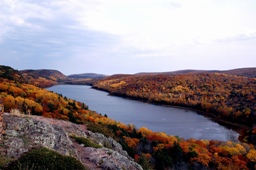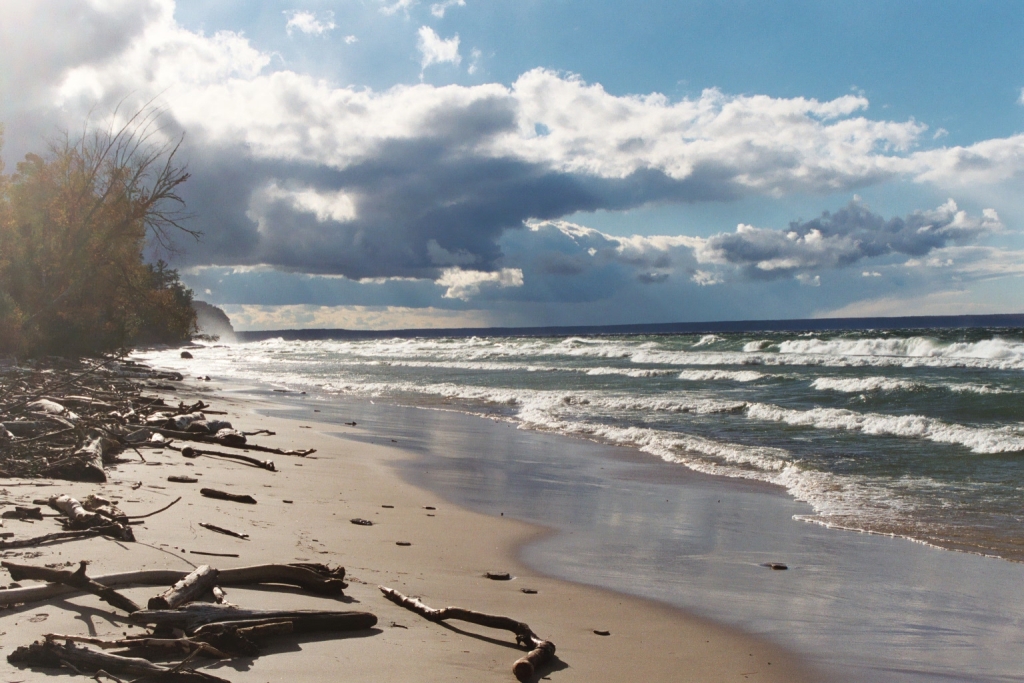|

Find us on Google maps
View Larger Map
Lab news
2020-2021
- People: Lots of good changes. Undergraduate researcher turned lab tech Kathryn started her PhD program at UW Madison. Postdoctoral researcher Sara started her own lab at UC San Diego. and former PhD student Marian will start her own lab at Cornell University. Thank you for helping to write wonderful parts of our lab's story and congrats everyone on carving out your next steps! Oh, and for helping me get tenure this past year :-)
- Research: several new publications, a review on genetic and physiological diversity in Microcystis, several studies on how the microbiome affects interactions between eukaryotic algal and cyanobacterial hosts, and documenting host-specific microbiome selection. Also a technical paper evaluating tools to address redundancy in metagenome assembled genomic datasets, a paper on understanding how microdiversity contributes to the ecological success of Limnohabitans in Lake Michigan and beyond, and one on how diversity-functioning relationships differ in free-living and particle-associated commnunities in freshwater lakes.
- Teaching: Zoom teaching is not much fun, but it got us through when needed. Happy to tap into the energy of in person teaching again this Fall, while finding ways to accommodate everyone based on their ability to be present in class.
- People: Bella Wash and Madelyn Foulkes join the lab as undergraduate researchers as part of the UROP program, helping on the algal-bacterial interactions project. Welcome!
2019
- Research: ESA Conference in Louisville. Kathryn and Sara present!. Vincent presents at ASM Microbe in San Francisco and at the SAME16 meeting in Potsdam, Germany`
- Research: We have been awarded additional NOAA funding in collaboration with NOAA GLERL, Melissa Duhaime, and Greg Dick to link traits to genes in Microcystis to help better predict bloom dynamics in Lake Erie. In addition we have received funding from the Invasive Mussel Collaborative to track the impacts of mussel removal on avian botulism causing microorganisms at SLeeping Bear Dunes
- Teaching: Sara leads a group of students in their independent research project un the MSci course.
- Research: Several new publications. Ruben publishes his work on the genomic underpinnings of ecological success of a Ramlibacter species in highly nutrient-limiting conditions. Sara leads a publication on the causes and consequences of genomic hetrogeneity in Microcystis. Marian leads a study on using a machine learning approach to see which groups of taxa are linked to flow cytometry functional groups that typically discriminate highly active and less active members of aquatic communities.
- Research: FIeld work on Lake Michigan, Lake Erie, Lake Huron, and at Sleeping Bear Dunes, where we continue on our project on avian botulism, now as part of a mussel removal project, tracking the impacts on microbial community ecology.
- People: James Lauer join the lab as a undergraduate researcher, helping Sara on the algal-bacterial interactions projecgt. Welcome!
2018
- People: Jinny Yang is joining the lab as a PhD student this fall! Jinny brings a background of microbiology and ecology to the lab, having finished her Masters in Taiwain looking at diversity-functioning relationships between microbial prey and consumers and will start out on better understanding how bacterial interactions affect the impact of the algal phycosphere on host fitness. Welcome Jinny!
- Research: Marian has completed her PhD! She is continuing her research career in the Ochman Lab at UT Austin, supported by a Simons Foundation fellowhip. Congrats Marian!
- Research: We have been awarded NOAA funding to understand how susceptibility to dreissenid mussel grazing varies among different strains of Microcystis. In addition we have received funding from the National Parks Service to study avian botulism causing microorganisms at Sleeping Bear Dunes National Lakeshore
- Teaching: Sara leads a group of students in their independent research project un the MSci course.
- Research: Several new publications: Ruben publishes his work on the effects of dreissenid mussel grazing on bacterial communities, using flow cytometry to track community composition shifts. Edna leads a publication on the ecology of Verrucomicrobia in freshwater lakes. Sara leads a study on applying ecological theory to improve algal biofuel yields, and I write a chapter for a book on microbial population genomics.
- Research: FIeld work on Lake Michigan Lake Erie, and at Sleeping Bear Dunes, where we started a new project on avian botulism, which has a link to dreissenid mussel invasion.
- People: Dylan Baker and Anna Ortega join the lab as a undergraduate researchers, helping Sara on the algal-bacterial interactions projecgt. Welcome!
2017
- People: Nikesh Dahal is joining the lab as a PhD student this fall! Nikesh brings a background of microbiology and ecology to the lab and will start out on our NSF EAGER-funded project studying the role of phenotypic plasticity in the response of microbial systems to disturbance. Welcome Nikesh!
- Research: Marian has been awarded an NSF DDIG to support her traits-based approach to understand contrasting diversity-producitivity relationships in freshwater free-living and particle-associated bacteria. Congratulations, Marian!!!
- Research: We have been awarded an NSF EAGER award from the Population and Community Ecology Program to study the importance of phenotyic plasticity in bacterial community responses to disturbance.
- Teaching: Vincent and Kyle help teach the MSci course on the "Monster in Lake Erie" and guides incoming students interested in STEM majors through an independent project examining the impact of invasive dreissenid mussels on cyanobacterial harmful algal blooms.
- Research: Michelle leads a publication on the sense and nonsense of oligotypes in Frontiers in Microbiology and Vincent leads a paper published in mSphere studying the impacts of invasive zebra mussels on bacterioplankton communities.
- People: Kyle Buffin and Kathryn Schmidt receive MCubed summer fellowships to perform research on adaptation of Microcystis to varying lake nutrient levels (Kyle), and impact of algal-bacterial interactions on algal competition (Kathryn). Yay!
- Research: ESA Conference in Portland. Marian and Sara present!`
2016
- People: Sara has been selected to become a Dow Postdoctoral Fellow in Sustainability at UM to support her research investigating how algal biodiversity can lead to increased and more sustainable biofuels production and to investigate the role of algal-bacterial interactions in influencing algal competitive interactions. Sara is co-advised by Prof. Brad Cardinale, the lead PI on the project. Congratulations, Sara!
- Research: Masa leads a paper published in the Journal of Great lakes Research that establishes the first description of the bacterial communities along the long-term NOAA ecological research transect on Lake Michigan.
- People: Rachel Climer joins us as a UROP student to study Limnohabitans populations in Lake Michigan in collaboration with Ruben Props. Samuel Bower and Kristen Hayden (UROP) join us to study the genomes of Microcystis and its heterotrophic associates. Welcome!
- Research: ISME Conference in Montreal. Marian presents intriguing work linking bacterial production to diversity in a freshwater estuary and how the story differs between free-living and particle-associated bacteria. Michelle presents interesting work evaluating the ecological and evolutionary significance of oligotypes and how they are misused in the literature. Go check out their work if you are there!
- People: Amadeus Twu receives a UROP summer research fellowship and is selected as a UROP scholar to continue his research during his sophomore year
- Teaching: Vincent helps teach the MSci course on the "Monster in Lake Erie" and guides incoming students interested in STEM majors through an independent project examining the impact of invasive dreissenid mussels on cyanobacterial harmful algal blooms.
- People: Ruben Props joins us for a 1-year stay as a visiting PhD student supported by the Belgian American Education Foundation. Ruben joins us from the Nico Boon's group at Ghent University, part of the research group I obtained my PhD in in Belgium! We also have a new postdoc joining us, on an NSF-supported collaborative project with Brad Cardinale: Sara Jackrel will study the molecular underpinnings of transgressive overyielding in the context of algal biofuels production.
- Research: Multiple publications from the lab: Marian publishes her first lead author paper in Environmental Microbiology on phylogenetic conservation of habitat preferences of freshwater lake bacterioplankton. Congrats! And Vincent leads a paper on an investigation of the extent of bacterial dormancy across the NOAA long-term transect on Lake Michigan in Frontiers in Microbiology and a second paper in Applied Environmental Microbiology (editor's pick! Yay!) on a mysterious organism predominating bacterial biomass in the depth of the worlds Great Lakes in collaboration with Ryan Mueller and our colleagues at NOAA GLERL.
- People and Research: Michelle Berry moves to the University of Washington Genome Sciences Department, and Edna Chiang moves to the University of Wisconsin-Madison Bacteriology Department to start their PhDs. Congratulations, good luck, and thanks you for all your contributions to both! Edna was the first undergraduate research in our lab and is a co-author on two published papers, contributing crucial microscopy data and is currently finalizing her first lead author manuscript! Michelle teamed up with Marian Schmidt to lift up the standards of our lab's publications to a fully open and reproducible standard and is the lead author on two manuscripts currently in review and a co-author on multiple other publications.
- People and Research: Masanori Fujimoto moves to Marquette University as an Research Assistant Professor. Masa was an author on two publications from our lab: (1) describing the seasonal dynamics of bacteriplankton along the NOAA long-term research transect in Lake Michigan, soon to come out in the Journal of Great Lakes Research, and (2) an investigation of the extent of bacterial dormancy across the same transect
2015
- People: Morgan Meade joins us as a UROP student to study the impact of zebra mussel invasion on sediment communities in Lake Michigan. Amadeus Twu joins us as a UROP student to study methanotrophs in a freshwater estuary. Kyle Buffin joins us as an undergraduate researcher to study the phyto/zooplankton-bacterial interactions in Lake Michigan. Welcome!
- Research: Vincent and Jay Lennon publish a chapter on microbial evolutionary ecology for ASM's Manual of Environmental Microbiology. A preprint is available at PeerJ preprints
- Research: Conferences galore. Marian presents her nearly completed first paper at GRC AEM, Masa present a poster at the JGI Users meeting, Michelle presents her work at the NSF-funded HABS workshop at BGSU, and Edna present her work at ASM2015 in New Orleans. Vincent presents the lab's work at ASM2015, the HABS workshop, and SAME14 in Uppsala, Sweden!
- Research: Monthly cruises on Lake Michigan as part of the CSMI 2015. We are also collecting samples on Muskegon Lake again with GVSU.
- Research: The lab's first paper was published in PLoS One. A bit of foundational work on our methods, with some useful lessons for the wider community with regards to the biases introduced by our sample preservation and extraction methods. Congratulations to Ann, Edna, and Marian!
- People: Masanori Fujimoto joins us for a 1-year postdoc, focusing on the bacterial communities in Lake Michigan, analyzing data generated as part of our JGI CSP.
2014
- People: More new people: Seana Florida joins us as a UROP student to study the impact of zebra mussel invasion on bacterial abundance in inland Michigan lakes. Joe Batdorff joins us as a UROP student to study the association between algae and bacteria. Welcome!
- People: Seasons changing, and the lab is too: Michelle Park graduates and Ann McCarthy heads back to biotech after a great two years of helping us start the lab, establish our core procedures, and conquering the Great Lakes. We wish them good luck on their future path. You will both be missed! Justin Millar joins us for the Summer putting his expertise with freshwater microbial ecology in the Mississippi River to work for our Summer field work. Later this Summer Michelle Berry joins us to work on the Water Center-supported lake Erie HABs project. Welcome!
- People: Congratulations to Edna Chiang who was selected as a ASM Undergraduate Research Fellow and a UM Beckman Scholar , which will support her research for the next 16 months!
- Research: The lab obtained funding from the University of Michigan Water Center for two projects: One will support our work to use environmental DNA-based quantification of dreissenid mussels and their impacts on freshwater microbial community structure and function, the second will fund a project led by Dr. Gregory Dick (UM EES) to integrate microbial genomics, environmental chemistry, and ecosystem processes to understand harmful algal blooms .
- People: Congratulations to Edna Chiang who was awarded an Honors Summer Fellowship and to Amelia Waters who was awarded a UROP Summer Biomedical and Life Sciences Fellowship !!!
- People: Michelle Park joins the lab as an undergraduate researcher for Winter 2014. She will attempt to render algal cultures from the Cardinale lab bacterium and fungal-free.
2013
- People: Amelia Waters joins the lab as an UROP undergraduate researcher for Fall 2013 - Winter 2014. She will study the effects of zebra mussel invasion on freshwater microbial communities
- Research: Marian and Vincent join NOAA Great Lakes Ecological Research Laboratory's September 2013 research cruise on Lake Michigan to sample microbial communities. This is the last series of samples that will provide microbial DNA and RNA to be sent to the DOE Joint Genome Institute for sequencing as part of our Community Sequencing Program proposal which was accepted last year.
- Web site: We took some time this summer to update our Research projects and Join the lab pages to reflect current activities in the lab.
- Research: During the summer and fall, Marian is sampling inland lakes to investigate the impact of zebra mussel invasion on heterotrophic bacterioplankton.
- Research: Ann and Vincent join NOAA Great Lakes Ecological Research Laboratory's July 2013 research cruise on Lake Michigan to sample microbial communities. And for once, the weather was perfect! (Quote from the captain: "It only gets better than this if this was a cruise on the Caribbean")
- People: Natalie Imirzian joins the lab as an undergraduate researcher in Summer 2013. She will work on microscopic and molecular characterization of freshwater algal-associated microbial communities
- Research: Ann and Marian join NOAA Great Lakes Ecological Research Laboratory's April 2013 research cruise on Lake Michigan to sample microbial communities.
- Teaching: Microbial Ecology (EEB446) will be offered again in Fall 2013; a newly developed course named “Life: decoded. Genomics in Society (BIOLOGY144)” will be offered in Winter 2014.
- People: A great week for Marian Schmidt who was awarded an NSF GRFP (2013-2017), her first Block research grant to support her 2013 Summer research, and was selected for a course on use of isotopes in ecology. Congratulations Marian!!!.
2012
- Research: We were awarded a collaborative M-Cubed research grant (2012-2014) to study how algal-algal and algal-bacterial interactions may be leveraged for improving biofuels production
- People: Edna Chiang joined the lab as an undergraduate researcher in Fall 2012. She is working on microscopic and molecular characterization of inland lakes and Great Lakes bacterial and nanoflagellate communities
- Research: We were awarded a 2013 DOE JGI Community Sequencing Program grant to characterize microbial communities in the Great Lakes!
- People: Marian Schmidt is the first PhD student to join the lab, in Fall 2012.
- Research: Ann joins NOAA Great Lakes Ecological Research Laboratory's July 2012 research cruise on Lake Huron and is featured in a local news story !
- People: Ann Marie McCarthy joined the lab as Lab Manager in June 2012
- The new lab is ready: we moved into the newly renovated space in June 2012!
- Research: recent work on determining in situ evolutionary rates for bacterial populations appears in Science magazine
- Research: recent work on linking evolutionary divergence to ecological differentiation
- Research: Vincent joins NOAA Great Lakes Ecological Research Laboratory research cruise on Lake Huron to sample microbial communities.
- People: Vincent Denef started as Assistant Professor in Ecology and Evolutionary Biology in January 2012 as part of an interdisciplinary cluster in Microbial Ecology at the University of Michigan.
Wiki
Access restricted to Denef lab and collaborators: please contact Vincent if you need access to the lab protocols wiki
|
|
Welcome to the Laboratory of Microbial Evolutionary Ecology at The University of Michigan
Core question and its importance. The Denef Lab contributes to answering a core question in ecology: how do within- and between-species interactions shape microbial community diversity, composition, and functioning? It is important to focus on between-species interactions as they determine the makeup of communities, which in turn shapes ecosystem functioning, from agricultural crop biomass production to the magnitude of soil greenhouse gas emissions. It is important to consider within-species interactions, particularly between genetically dissimilar individuals of the same species, as recent insights, including from our own work, have shown important ecological consequences of within-species genetic diversity. The small genome sizes and short generation time compared to macroscopic life make microbial systems particularly interesting model systems for ecological theory development regarding this aspect of within-species interactions.

|
"A lake is the landscape's most beautiful and expressive feature. It is the earth's eye"
-Henry David Thoreau (Walden; 1854)
|
Study system and its relevance. We use freshwater phytoplankton and bacterioplankton communities as a study system. Understanding how within- and between-species interactions influence phytoplankton composition is important as phytoplankton provide half of Earth’s net primary productivity and their community composition regulates productivity and nutrient cycling. In addition, when phytoplankton composition shifts to harmful bloom-forming species, it negatively affects water quality and mass transfer up the food web, both of which are critical to environmental and human health and economic well-being. Understanding the forces that shape bacterioplankton communities is important as their diversity and composition can exert strong controls on carbon cycling. This is important as freshwater systems are hotspots for carbon emissions to the atmosphere with net emissions of carbon dioxide rivaling the net uptake by the oceans.
All pictures by V. Denef, except where noted otherwise
|


